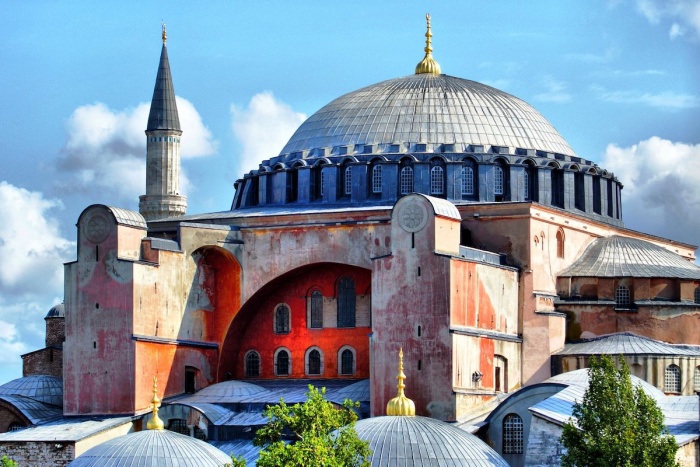Hagia Sophia, an İstanbul landmark with a history dating back more than 1,500 years, is again in the spotlight due to an unpleasant odor that has led to complaints three years after it was converted from a museum to a mosque by the Turkish government, local media reported Monday.
Designated a UNESCO World Heritage Site, Hagia Sophia has faced a series of challenges since its reversion to a mosque in July 2020 based on a controversial decision by President Recep Tayyip Erdoğan. The move was met with international criticism, with concerns about the preservation of the architectural and artistic treasures inside the structure.
Sabah namazına Ayasofya’ya gittim, birçok insan da Ayasofya’nın bereketinden istifade etmek için Ayasofya’ya akın ediyor lakin maalesef ülkenin bir numaralı mabedi gerekli muameleyi görmüyor. İçerisi o kadar havasız ve kötü koku içinde ki namaza odaklanmak çok zor+ pic.twitter.com/ZvVnRSZkKS
— Furkan Soylu (@abirusebiil) August 19, 2023
Social media user Furkan Soylu recently reignited the debate when he shared his experience of attending morning prayer at Hagia Sophia. Describing the interior as “stuffy and filled with an unpleasant odor,” Soylu’s comments sparked a flurry of online discussions. Many echoed similar grievances, with some even suggesting the reversion of Hagia Sophia to its previous museum status.
However, Soylu was quick to emphasize that the solution lies in better maintenance practices rather than changing its status. “The poor condition of the mosque is a matter to be resolved with shoe racks, tourist access and cleaning,” he wrote.
Can Okar suggested on X, formerly known as Twitter, that the unpleasant odor might be attributed to the “stench of feet,” pointing to the intent to use it as a cathedral in the original construction.
I’ve been asked why the Hagia Sophia stinks.
I’m really sorry to tell you this but the smell is 99% likely to be the stench of feet.
It turns out that Isidore of Miletus and Anthemius of Tralles didn’t have the foresight in 537 AD to aerate it more in case it became a mosque. pic.twitter.com/2mor93MlJy
— Can Okar (@canokar) August 20, 2023
“I’ve been asked why the Hagia Sophia stinks. I’m really sorry to tell you this but the smell is 99% likely to be the stench of feet. It turns out that Isidore of Miletus and Anthemius of Tralles didn’t have the foresight in 537 AD to aerate it more in case it became a mosque,” Okar tweeted.
In April 2022 another controversy arose when reports emerged of damage to the Imperial Gate, dating back to the Byzantine era. This incident, coupled with allegations of damage to historic marbles in the mosque, drew international attention and concerns about the landmark’s preservation.
In May journalist Engin Açar, a correspondent for the pro-opposition TELE1 TV station, was briefly detained for reporting on the damage to Hagia Sophia. After his release, Açar highlighted graffiti on the external walls of the monument, further emphasizing the need for increased security measures.
The way #Erdogan's regime is vulgarizing a #worldheritagesite is preposterous! And I'm saying this neither as Greek nor as Orthodox but merely as a civilized person. #hagiasophia https://t.co/xsrQhDmfWx
— Xen K. (@itsxenk) August 20, 2023
The iconic structure is also gearing up for extensive restoration due to concerns over its minarets’ inability to withstand major earthquakes. A team of experts has been assembled to oversee the restoration, which is estimated to take 50 years.



